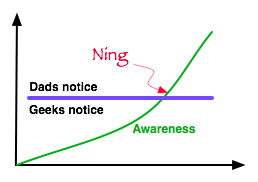Without us, you are nothing!
01 October 2007
economics events vc web-20
Browsing the website for the Web 2.0 Summit coming up in October, I tripped across the Launch Pad portion. The introduction says, in part
While it’s great to be chosen to launch your new company at a conference like Web 2.0 Summit, the reality of the market is that the majority of successful Web 2.0 companies do more than just launch products. They also often pass the test of VC scrutiny— that's how the market determines who wins and loses in the world of startups.
I may simply be reading it wrongly, but the implication is that the VCs decide the winners and losers in the world of start-ups.
Or maybe having a VC approve of your idea, and vote with his dollars means you have a better chance of winning in the market (of consumers, not venture capitalists).
But I thought VCs acknowledge they only pick one winner out of ten, and hope it goes big. It's also said that 90% of all new businesses fail. Seems like the odds are the same regardless of VC scrutiny.
Mix in the whole web 2.0 concept (this is the Web 2.0 Summit, after all), which implies that we're reaching a point where venture capital means less and less, and it starts to make even less sense to me. Web 2.0 is trying to relight the mythology of two guys bootstrapping in a garage (or trendy downtown condo).
Am I missing the boat, or is this just a case of someone taking themselves a tad too seriously?
 As a youngster, I did the things normal youngsters would do. I went to school, church, camp, scout meetings. At all of these places, if I did what was expected, many times I'd get a gold foil star.
As a youngster, I did the things normal youngsters would do. I went to school, church, camp, scout meetings. At all of these places, if I did what was expected, many times I'd get a gold foil star. Today
Today